Although he's now a successful entrepreneur, Harsh Roopchand started his hospitality journey at the bottom and worked his way up through the ranks.
Welcome to the new Human Stories series by TMS, where we get to know Hong Kong through its many different faces. This month, we’re speaking with Harsh Roopchand, the co-founder of 8 creATEive, The Pontiac and more.
"Cutthroat, dynamic and exciting" – these are the three words that 8 creATEive and The Pontiac co-founder and director Harsh Roopchand would use to describe Hong Kong's hospitality scene. Dressed in an elegant navy suit and standing tall, Roopchand handed us a box of Amalfitana's famous Nutella pizza with a warm smile as we met for an interview.
This interaction perfectly illustrates the hospitality entrepreneur's demeanor – confident, dapper, direct and kind. We sat down with him to talk about his journey into F&B and his experiences working in Hong Kong's challenging hospitality industry.
Source: The Millennial Source
Working his way up
Although he's now a successful entrepreneur, Roopchand started his hospitality journey at the bottom and worked his way up through the ranks. At just 16 years old, he got his first taste of the hospitality grind, peeling umpteen garlic and onions and making kebabs in the tandoori section of the Taj Mahal Hotel in Mumbai, learning the ins and outs of the trade.
Roopchand had explored a few schools after attending the Harrow School in England, where he studied things like chemistry, economics and theater. But eventually, he landed in hotel school, deciding to attend École Hôtelière de Lausanne (EHL) in Switzerland to study hospitality.
"In order to go to Swiss hotel schools, you need to work in the hotels before, so that you either know it's for you, or it's not. And it's extremely tough at that age," Roopchand recalls of working at the Taj Mahal Hotel. "It was tough, and I did it. And I remember I could have quit and said, 'Sorry this is not for me.' But I said 'No, I'm going to do it. I love cooking."
His culinary passion was stoked from an early age, especially through his relationship with his grandmother. "My grandma was a big support," says Roopchand. "She loved that I loved cooking. She loved cooking. And it was something that we had a link with, and we would share recipes. And I just kept going, and I'm glad I didn't stop."

His love of cooking and early experiences working in kitchens was the tinder stick that ignited his foray into hospitality. But even before his university education, Roopchand's path seemed to lead him in the direction he aspired to go.
"I was very fond of theater ever since I was a kid also," he reminisces. "Then again, there is a link between hospitality and theater, I learned that before I went into hotel school – it's back of house, front of house. Front of house is a show. Whether you're having a bad day or not, you have to put on a smile like an actor."
But, once he landed at EHL, Roopchand could fine-tune his focus on the business side of things while still getting a taste for the day-to-day in restaurant life.
"I have a lot of respect for École Hôtelière de Lausanne. The institution is one of the oldest in the world. … And one of the things that I love about EHL and hotel school in general, you had to study for half the year, and you had to work for half the year," Roopchand explains. "So, I definitely think the education that I got from EHL is invaluable."
Roopchand enjoyed getting his hands dirty, so to speak, and getting to know both sides of F&B. "So since then I worked at various different things. I think at hotel school, one of my first proper six months internships was at the Noga Hilton Hotel in Geneva, where I worked in room service and minibar," he says. "And I'll never forget some of the stories. I mean, working in a hotel is like being in a movie. Every single day is a different story, and it's very entertaining when you're 18 years old."
At EHL, Roopchand specialized in business strategy. His education prepared him to jump straight into sales and marketing and PR. Working closely with the CEO and owner of Six Senses Resorts & Spas and Soneva at the time, Sonu Shivdasani, Roopchand is grateful to have had him as a mentor. This taught him the ropes to later open his luxury lifestyle business consultancy, ÉPIQUE.
But hospitality isn't just grueling work ignited only by the flames of passion. It's also pretty fun. "I remember one day I got a call. It was 6 a.m. You don't want to do that morning room service shift," he says. "But it's very important because everyone orders room service for breakfast, and you get a call saying, 'This is Mr. Moore, Roger Moore,' and you're like he even said it as if he would say, 'This is Mr. Bond, James Bond.' And yeah, we got to serve people like Mr. Moore and royalty from middle-eastern Emirs, Sheikhs to many other famous people. And it was just a great experience."
Breaking into the Hong Kong F&B scene
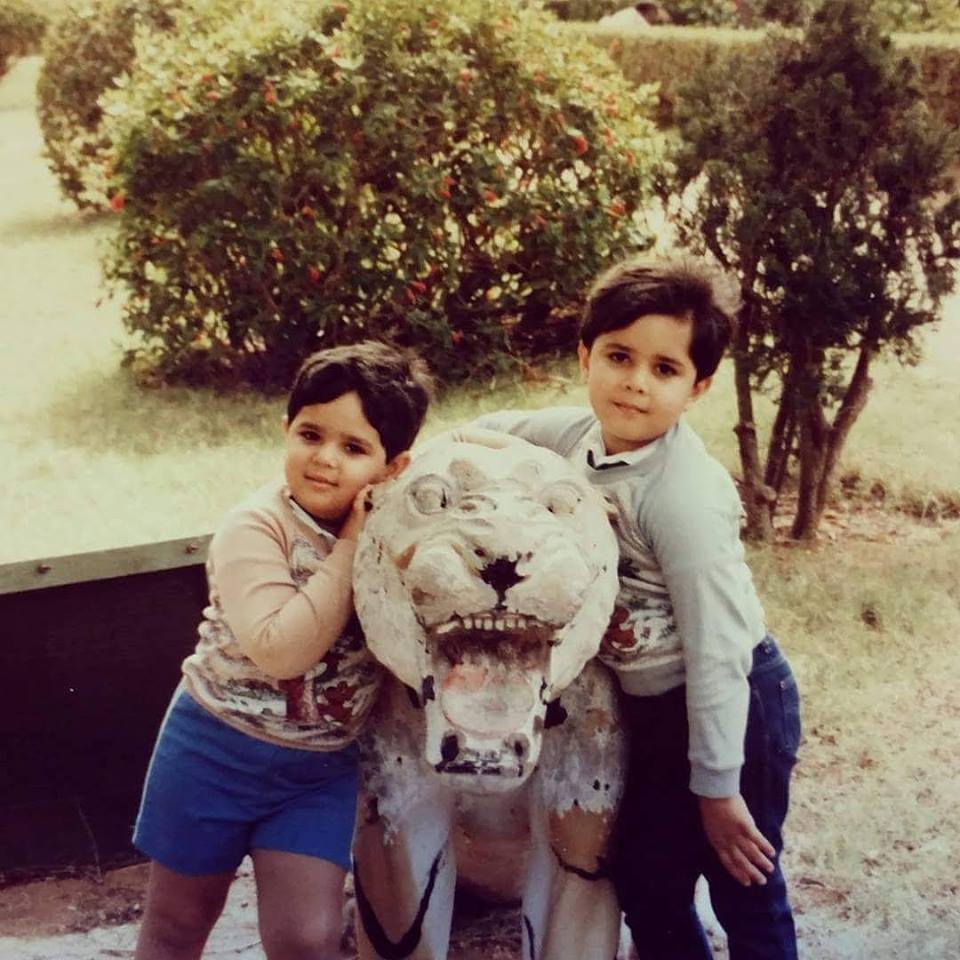
From working after graduation in sales and marketing for hotels and property management outfits to consulting hospitality and lifestyle businesses in Hong Kong and the region, Roopchand's venture into opening his own restaurant started with his brother, Rohit, who was working for a New York hedge fund at the time. Unlike Roopchand, his brother never attended hotel school or really dabbled in hospitality. But, he had a deep love of food and a particular New York restaurant called Fatty Crab.
"He used to come visit me quite a bit when I lived in Bangkok, Singapore, and then finally in Hong Kong," Roopchand says. "And he really liked the following and kind of network I had garnered in Asia. And that's when he actually came to me and said, "Why don't we open a restaurant together in Hong Kong?"
Roopchand was down, and he asked his brother what it was all about. "It's a Southeast Asian restaurant, and I think it would do amazing in Hong Kong," he recalls his brother saying, to which Roopchand stared at him blankly.
"Why would we bring a Southeast Asian restaurant from New York to Hong Kong, when I have lived all over Southeast Asia?" he wondered.
"And he was like, 'Just come with me to New York, and you have to come and experience it.' And I can never explain that feeling," Roopchand gushes, shaking his head. "I mean, I went to the West Village Fatty Crab. It was a charming, quaint little restaurant with the best of food, best of drinks, best of service, and the best of hospitality. And I was floored. The music was great. Everything was amazing.
"I remember we finished dinner there. My eyes lit up. We went to Employees Only – it was a very famous bar nearby – for a drink after. I hugged my brother and I said, 'I'm in.' I spent the next few weeks, much thanks to our New York partners at the time, training at all their restaurants, as well as eating my way through New York City."
After learning the ins and outs of the business, Roopchand headed back to Hong Kong to open the city's very own Fatty Crab. "We hit the ground running," he says.
The team was perfect. His brother looked after the finance side, and he looked after the PR. "Out of all the openings we have done, it was one of the stronger ones. … There were lines for ages at Fatty Crab. I remember in the first three months, it was extremely hard to get a table there." Roopchand's eyes still light up as he talks about it.
"In those days you could name the restaurants, the really cool, fun, unpretentious restaurants, on one hand, in Hong Kong. … And today, I'm so proud of being in this market and grateful to see where it has gone because there are hundreds now. Every single area from Sai Ying Pun to Tai Hang to everywhere else has their own little subset of cool restaurants that you can go to. So the Hong Kong market's really matured in the past 10 years."
But Fatty Crab was also Roopchand's first kick in the shin after breaking into Hong Kong's F&B scene, which he describes as "cutthroat." The restaurant, unfortunately, closed after about two years. But this didn't stop the brothers from continuing to tackle the city with their ideas.
Since then, 8 creATEive, with the respective partners, has opened almost half a dozen bars and restaurants, from a couple of branches of Amalfitana and Fratelli, two Italian concepts; to Rummin' Tings, a Caribbean-inspired bar and restaurant; and separately The Pontiac, one of Asia's 50 best bars.
Bumpy roads and learning curves
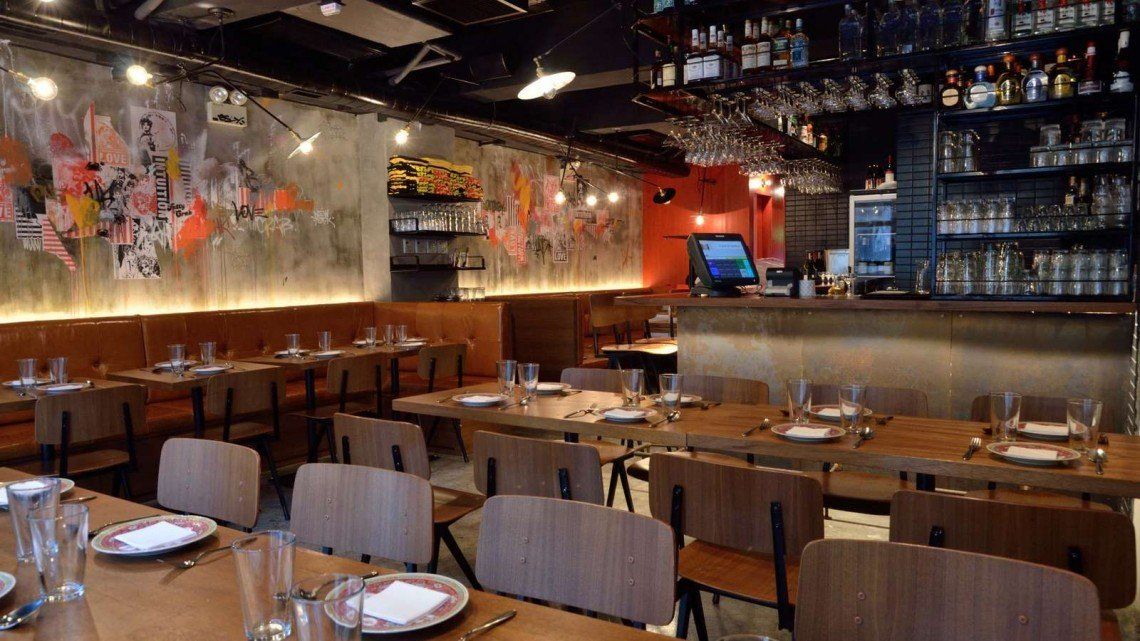
The last few years since the start of the pandemic have hit many industries hard – especially hospitality. Lockdowns and quarantines meant people weren't going out as much, and many businesses and restaurants shuttered their doors with the lessened foot traffic.
In Hong Kong, in particular, the 2019 protests brought more upheaval to the community, and some of the world's toughest COVID restrictions meant many in the hospitality scene would struggle to stay afloat.
But passion fueled Roopchand and his ventures to get through Hong Kong's days of restrictions. "It's like taking your world and turning it upside down," Roopchand says of adapting during the toughest times of the pandemic. "We had to go each one day at a time and just not giving up. I mean, you could say, "Let's just close the doors," but then who's going to pay your staff? It's so unfair, right? The team is very important to us. We wouldn't be where we are without our team."
Still, the struggle was very real. "It's very hard to deal with the disappointment. I won't lie to you," he says. "For us, I mean, I don't have any kids as yet. So for me, my babies are my venues (and my furbaby Bear). Fatty Crab was the first one, which was a partnership with a group in New York. And it still meant a lot to us, and it hurt a lot when we closed. But that survived for a couple of years, and I think we learned a lot of lessons along the way.
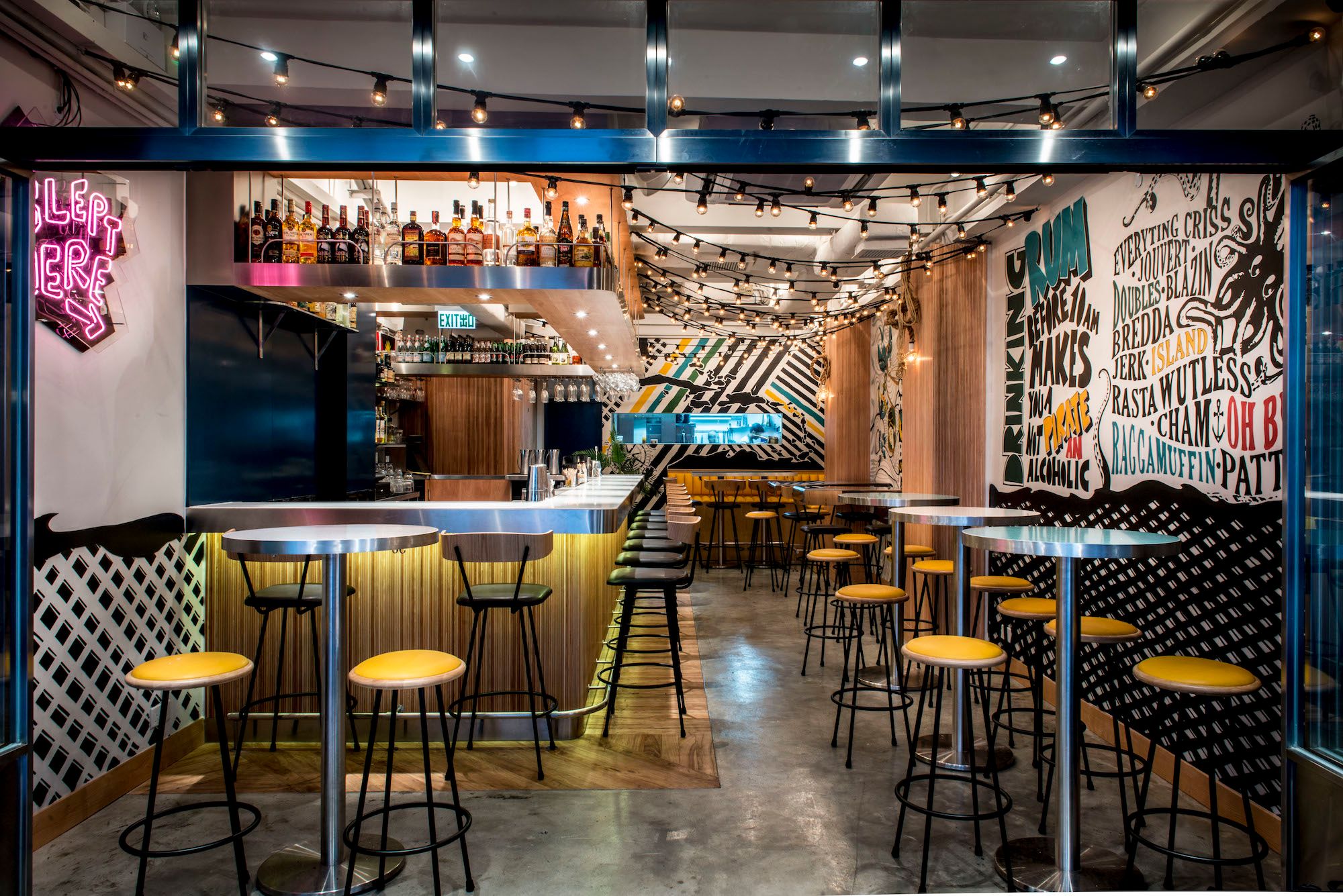
"The one that hurt even more, I would say, was Rummin' Tings. Rummin' Tings was our second venue in Hong Kong. … It was loved by so many people. I still can't tell you how many people come to me and say, 'Hey, when are you opening Rummin' Tings again?' Sadly, we're not. …
"But that was a very, very hard one for us because that was not two years, that was six years. And it was beyond our control. It was the pro-democracy protests that was a big first slap in our face. There were riot police right in front of our doors, hundreds of them on Halloween night."
From the protests to COVID regulations to "greedy landlords," Roopchand's ventures have had their fair share of challenges and setbacks. But it doesn't hurt that people in this city like to eat.
A government survey found that, from 2019 to 2020, Hong Kong residents spent, on average, more than double what New Yorkers spent the same year on takeaway and restaurant meals. And a report last year from CBRE revealed that the city's number of licensed restaurants grew 3.9% through last October – which is slightly higher than pre-pandemic numbers.
But, hardships also created new opportunities. "We were struggling so much as a bar because there was a point where the government said the bars can't open," Roopchand remembers of The Pontiac. "We're like, what should we do? So we created this pop-up concept called Ponty Café."
Roopchand along with his business partner, Beckaly Franks, came up with the idea to serve coffee-based cocktails, coffees and food in a pop-up to adapt to the ongoing COVID situation. It eventually grew to a brick-and-mortar concept. The partners decided to open Ponty Café right next to the original The Pontiac bar, which Franks now runs with her wife Ezra Star. "And we couldn't be more excited," he beams. "We adapt with time."
For Roopchand, so far, it's been all about rolling with the punches and dusting yourself off when you get knocked down. "I think it's for us to be tough about it, thick-skinned when we have to, and don't let it get you down," he explains. "When one door closes, another opens with two arms."
What matters most
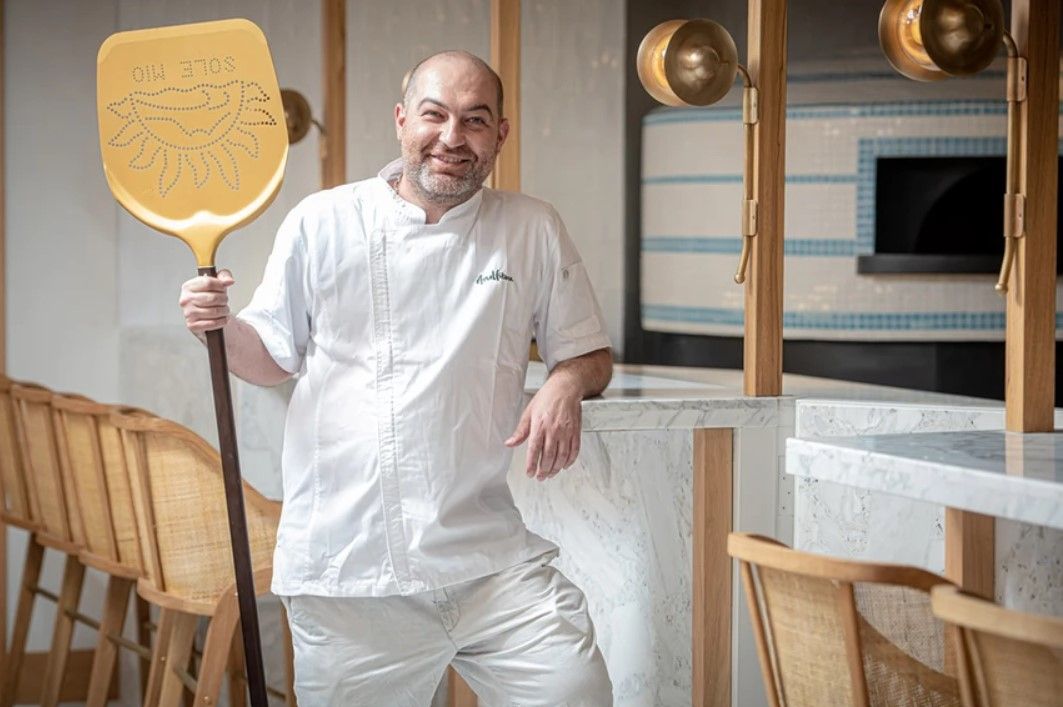
It's all about the team. Well, and passion, of course. "I think to be completely honest, it's quite easy to stay humble based on what we do," Roopchand says. "This is not about us. This is about our teams. They're down in the trenches every single day doing the magic."
His upward trajectory through the F&B and hospitality ranks has helped Roopchand develop a successful management style and approach to how he develops and runs his many ventures along with his respective partners.
"I think by having had the good fortune and pleasure of working in some lower positions from dishwash to cook to waiter, it helps me in my approach today with my team because I can relate to exactly what they're going through, having been there and done that," he says. "And that's where our approach comes. I think we're much more compassion and empathy-driven."
Although he still undoubtedly possesses a seriousness in business, Roopchand's ability to empathize is part of the DNA that makes up the genetics of his restaurant groups. Everyone is treated with equal respect. "Many people say, 'Oh, you need to be Draconian, very tough in order,'" he says. "Sure, some people do it that way. My approach is quite different. I'm friends with dishwasher to garbage collector to waiter to billionaire tycoon, no problem.”
"We can get along with all of them, but it helps us in the journey to understand what the team is going through."
"I'm not sure you can learn empathy, to be completely honest," Roopchand points out. "I think it's how we were brought up," he says of himself and his brother. They have their grandparents to thank for that strength. "They were just kind and warm and loving people."

His easygoing nature and playfulness are even reflected in his LinkedIn profile, where his job titles range. He's been "Direttore" at Fratelli to "Consigliere" at Amalfitana and "The Dude Upstairs" at award-winning bar The Pontiac – even "Black Beard" at Caribbean-inspired Rummin' Tings.
Roopchand speaks highly of those he's worked with to get here as well, from his brother to his core team and business partner Franks and Jen Queen, The Pontiac's bar manager. "They both are very compassionate and empathetic, and they run one of the top hospitality teams as a result," he says of Franks and Queen. "I'm very proud of what they've achieved. I love seeing them growing, even in businesses apart from the ones we're partners in together."
From the ups and downs to the things he's learned, Roopchand says the sky's the limit. "We've been through a lot of moments in the hospitality world or in F&B. Happy moments, sad moments, challenging moments," he says.
"But for a little bar that we were closing – we actually closed the restaurant side [Fatty Crab], kept the bar side going – it wasn't a concept. It was the heart and soul that we changed. It was the team. And for that team to be on Asia's 50 Best Bars for seven years makes us smile about it."
But it's not all about the accolades, though they are appreciated. "We don't do it for the award, but it's great to see our team getting the recognition they deserve," says Roopchand. "And this is only the beginning. The sky's the limit. We're going to try our best. And I guess we're humbled based on how we were brought up by our grandparents. That it's not about us. It's about our team."
Hong Kong's still on the map
Despite the challenges of COVID, social unrest, sky-high rent and other things that lead Roopchand to describe the Hong Kong F&B scene as cutthroat, he also says it's "dynamic."
"I think when we opened our first restaurant here, Fatty Crab, and our business partners from New York came down, they couldn't believe the rents we were paying here," he remembers. "It's the highest in the world by far. Still today. And that just changes the playing field completely. It's a much tougher market, and it's much harder to survive."
But survival also comes through an expanding scene and a sense of community among businesses. "I believe in camaraderie. I think the restaurant side still has a way more to go," Roopchand says. "The bar side is a little more mature as far as that's concerned here. Much thanks to a very dear friend of ours, Michael Callahan," who he explains introduced him to his partner, Franks.
"Michael was at the forefront of creating the camaraderie in the bar industry in Hong Kong. He came over from Singapore for a couple of years with Proof & Company. He had actually started 28 Hong Kong Street, which is one of the best bars in Asia. And he had really forged this this 'We all work together attitude.' And I think on the restaurant side now it's getting there."
Now, with Hong Kong returning to business-as-usual, borders opening up and China's pivot from zero-COVID, there's even more room for the city's F&B landscape to bloom again – and expand.
"We haven't given up on Hong Kong," says Roopchand. "A lot of people look at Hong Kong and say it's over. I don't believe so. I think Hong Kong has come a long way in 10 years, just in the F&B scene. And it's a very resilient city, and it picks back up. There's some fantastic new openings even right now."
And, from Roopchand's point of view, it's a city looking to grow organically with a strong sense of community. "We feel motivated by our peers and seeing the success of some of the big groups or even smaller venues doing great," he says. "We love it. We go support. We dine there. We tell our friends. We get asked for recommendations all the time as well."
From his passion to his empathy to his team, things are only looking up for Roopchand – and Hong Kong's bar and restaurant community. "The restaurant business is not a business just to make money," he explains. "It's much more a passion business, a passion-driven business. And I would say you have to have the feeling and love what you're doing in order to be able to do it.
"Many people do look at us and say, 'Why do you do what you're doing?' Because the effort is a lot that goes into it, and the returns in comparison to some other investment may not be as much. But it's like I said, it's a passion project. We love what we do, and that's why we do it."

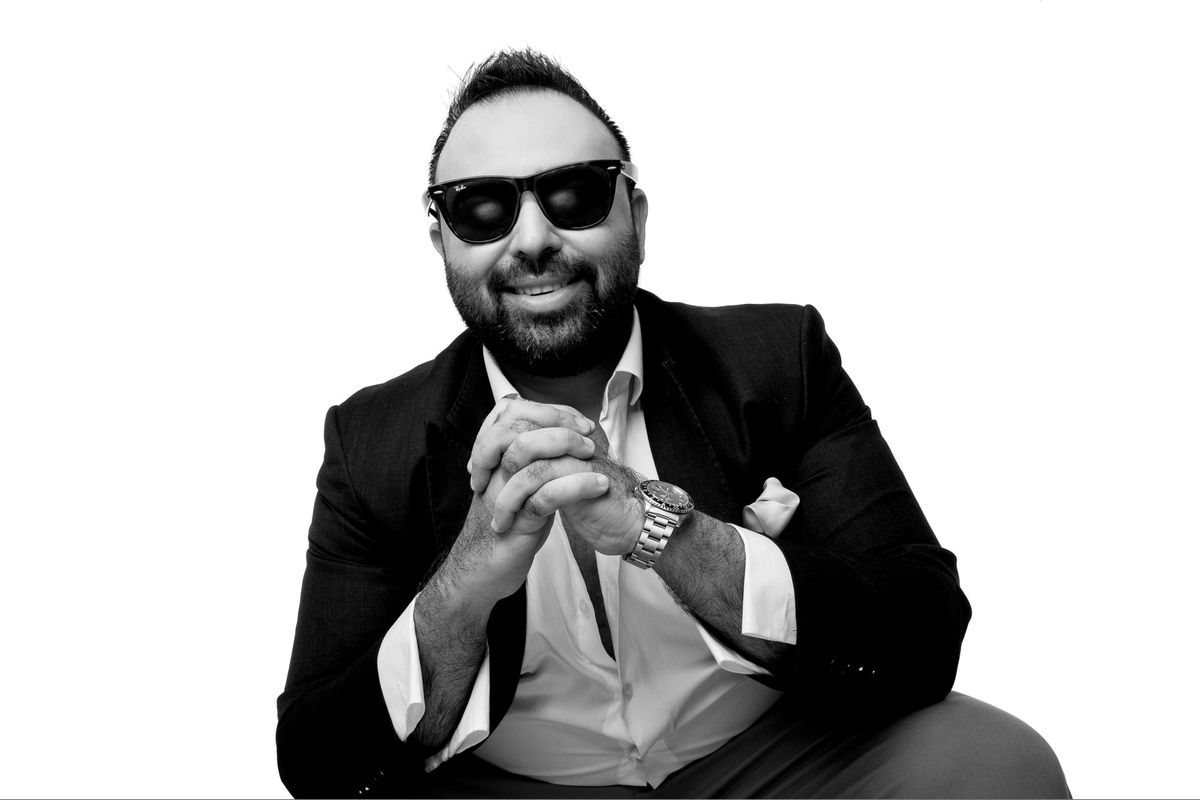



Comments ()